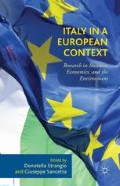Abstract
Information and Communication Technologies (ICT) are recognized as a key factor in socioeconomic development and societal evolution. According to the European Commission, “the ICT sector is directly responsible for 5 percent of European GDP, with a market value of € 660 billion annually, but it contributes far more to overall productivity growth (20 percent directly from the ICT sector and 30 percent from ICT investments). … The development of high-speed networks today is having the same revolutionary impact as the development of electricity and transportation networks had a century ago.”1 “The digital economy is growing at seven times the rate of the rest of the economy.”2 The pervasiveness of the ICT is changing the system of production and consumption, leading to the so-called information society. In this framework, the European Commission launched the Digital Agenda for Europe as one of the seven flagship initiatives of the Europe 2020 Strategy to exit the crisis.3 Moreover, the Internet is recognized as an important tool for increasing transparency, accessing information, and facilitating the active participation of citizens in the building of democratic societies “by acting as a catalyst for individuals to exercise their right to freedom of opinion and expression, the Internet facilitates the realization of a range of other human rights”.4 For this reason, “everyone should have the right to participate in the Information Society and States have a responsibility to ensure that citizen’s access to the Internet is guaranteed.”5
Access this chapter
Tax calculation will be finalised at checkout
Purchases are for personal use only
Preview
Unable to display preview. Download preview PDF.
References
AGCM -AGCOM (2014), Indagine conoscitiva sulla concorrenza statica e dinamica nel mercato dei servizi di accesso e sulle prospettive di investimento nelle reti di tele-comunicazioni a banda larga e ultra-larga.
AGCOM (2014), Indagine conoscitiva sul settore dei servizi Internet e della pubblicità online.
COM 245 (2010), Communication from the Commission to the European Parliament, the Council, the European Economic and Social Committee of the Regions. A Digital Agenda for Europe (DAE).
COM 784 (2012), Communication from the Commission to the European Parliament, the Council, the European Economic and Social Committee of the Regions. The Digital Agenda for Europe Driving European growth digitally.
EC (2014), Digital Agenda Scoreboard: Agenda Targets Progress report.
EC (2014), Digital Agenda Scoreboard: Digital Inclusion and Skills.
EC (2014), Implementation of the EU regulatory framework for electronic communication. SWD 249.
Di Maggio Paul, Eszter Hargittai, Coral Celeste and Steven Shafer (2001), “From unequal access to differentiated use: a literature review and agenda for research on digital inequality”. Working Paper n. 29, Princeton University Center for Arts and Cultural Policy Studies.
Di Maggio Paul and Eszter Hargittai (2001), “From digital divide to digital inequality: studying Internet use as penetration increase”. Working Paper n. 15, Princeton University Center for Arts and Cultural Policy Studies.
Esping-Andersen Gosta (1990), Three Worlds of Welfare Capitalism, Princeton: Princeton University Press.
Ferrari, Anusca (2013), DIGCOMP: A framework for developing and understanding digital competence in Europe. Retrieved from http://ipts.jrc.ec.europa.eu/publications/pub.cfm?id=6359
Howard, Philip N., Laura Busch and Penelope Sheets (2010), “Comparing Digital Divides: Internet Access and Social Inequality in Canada and in the United States,” Canadian Journal of Communication, 35, pp. 109–128
IAB Europe, Mediascope Europe (2013), The Connected Life of Digital Natives.
ISTAT (2013), Internet@Italia 2013. La popolazione e l’uso di Internet.
Montagnier Pierre and Albrecht Wirthmann (2011), “Digital divide: from computer access to online activities a micro data analysis,” OECD Digital Economy Papers, No. 189 (OECD Publishing).
Norris Pippa (2001), Digital Divide: Civic Engagement, Information Poverty and the Internet Worldwide. New York: Cambridge University Press.
OSCE (2010), Report on Freedom of Expression on the Internet. A study on legal provisions and practices related to freedom of expression, the free flow information and media pluralism on the Internet in OECD participating States.
Prensky Marc (2001), “Digital Natives, Digital Immigrants,” in On the Horizon, October 2001, 9(5). Lincoln: NCB University Press.
Sartori Laura (2006), Il divario digitale. Bologna: s Il Mulino.
Stiakakis Emmanouil, Pavios Kariotellis and Maria Vlachopoulou (2010), “From the Digital Divide to Digital Inequality: A Secondary Research in the European Union.” Mimeo.
UN (2011), Report of the Special Rapporteur on the promotion and protection of the right to freedom of opinion and expression.
Wirthmann Albrecht (2012), “The European social survey on the use of information and communication technologies by households and individuals,” ZSI Discussion Paper n.30.
Editor information
Editors and Affiliations
Copyright information
© 2015 Debora Di Gioacchino, Adriana Lotti, and Simone Tedeschi
About this chapter
Cite this chapter
Gioacchino, D.D., Lotti, A., Tedeschi, S. (2015). Digital Inequality in Italy and Europe. In: Strangio, D., Sancetta, G. (eds) Italy in a European Context. Palgrave Macmillan, London. https://doi.org/10.1007/978-1-137-56077-3_4
Download citation
DOI: https://doi.org/10.1007/978-1-137-56077-3_4
Published:
Publisher Name: Palgrave Macmillan, London
Print ISBN: 978-1-349-56424-8
Online ISBN: 978-1-137-56077-3
eBook Packages: Palgrave Economics & Finance CollectionEconomics and Finance (R0)

